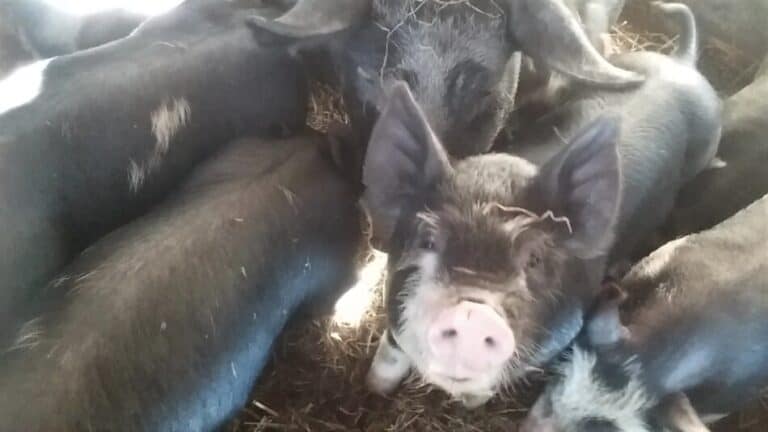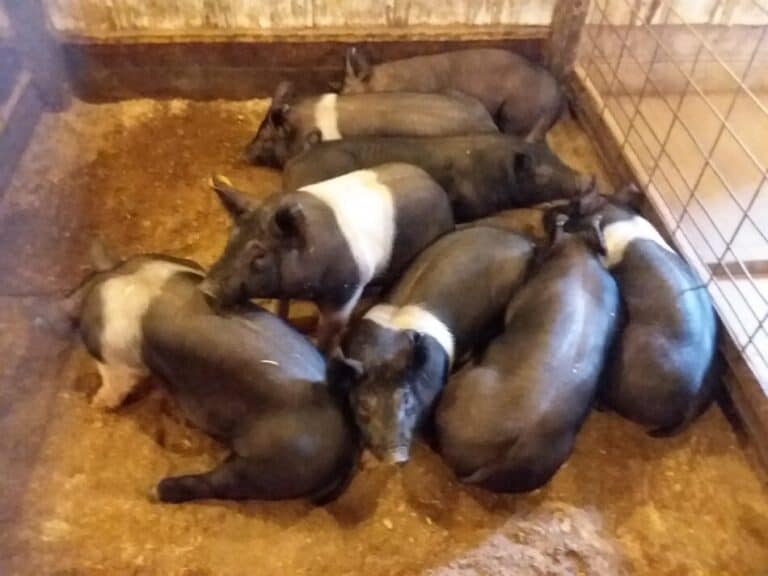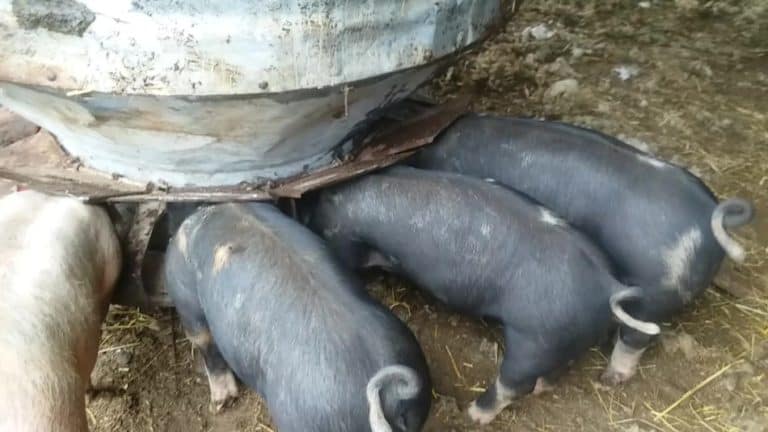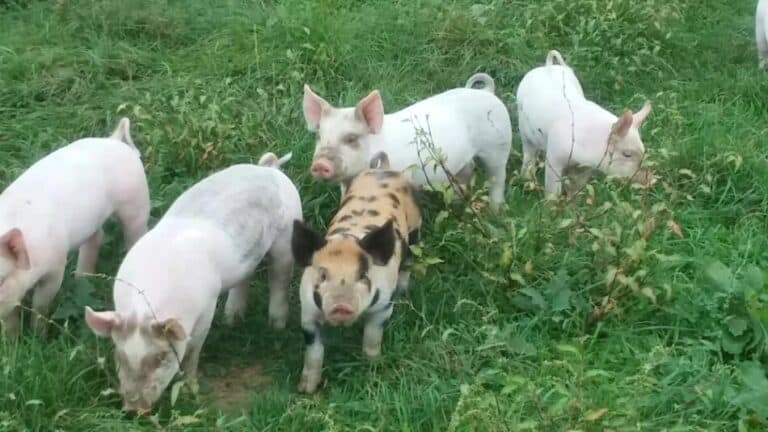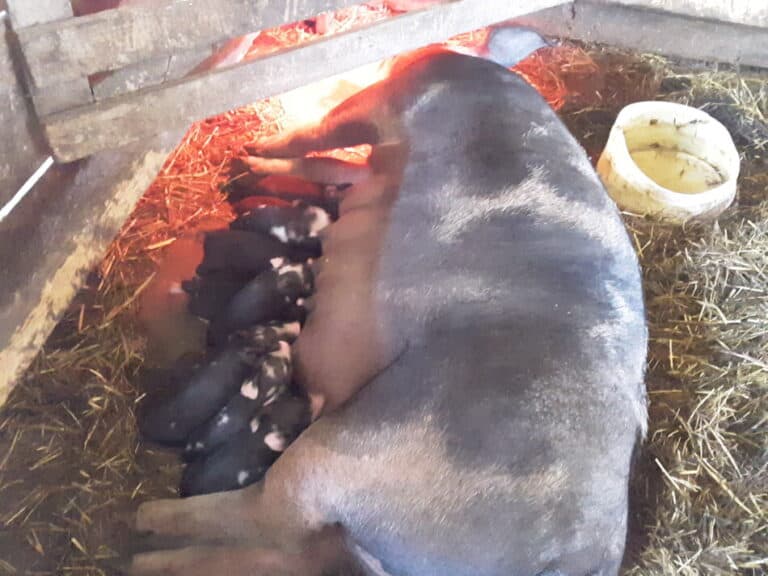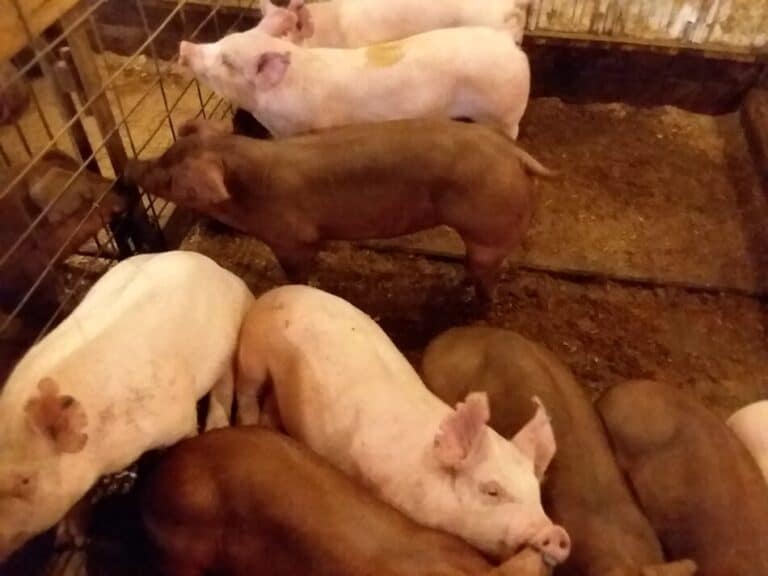Is Raising Pigs For Meat Worth It?
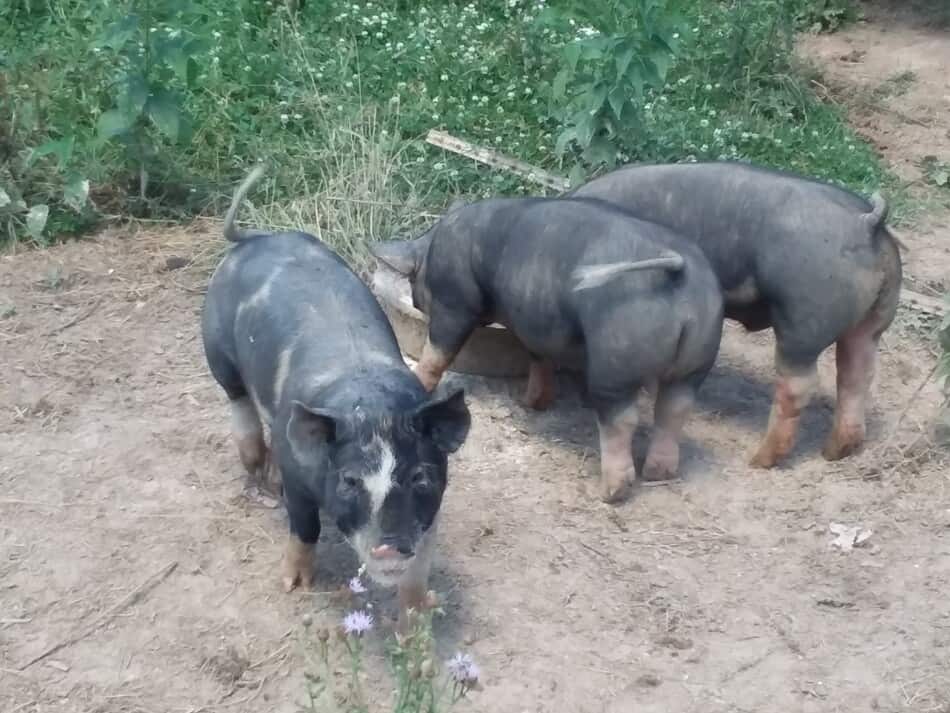
Home raised pork is amazing! You get superior taste and the satisfaction of knowing that your pigs were well cared for and lived a healthy life.
But what about the cost? It is really worth it to raise your own pigs or are you better off to buy it from someone else?
Raising a pig for pork will cost you an average of $3.23 per pound of freezer ready pork. The actual costs range from $2.93-3.53 per pound, depending upon your feed costs.
Pigs are one of the most “worth it” animals you can raise! They grow quickly and you get a lot of meat for your efforts.
| How the pigs were raised | Cost of pork (per pound) |
| Your home raised pork small group, raised on regular feed | $3.23 (average) |
| Small farm raised small groups raised as a side income, regular pig feed | $5.04 |
| Non GMO pasture raised Farm business, pasture and non GMO feeds | $8.44 |
Pigs Are Easy To Raise goes over the main points you’ll need to understand to make raising your own pigs go well!
Compare how the pigs were raised
Be sure you are using prices from pigs that are raised in the same way you will be raising your pigs.
What I mean by that is the $2.79 per pound pork in the cheapest grocery in town is not the number to use for an accurate comparison!
The lives and taste of these industrial pigs will be vastly different than your pigs.
The most accurate place to get price information for your area is to look up online pork for sale and get on a local website or see what comes up in online marketplaces.
Naturally Raise Happy Pigs shows you the things you need to give your pigs to keep them (and you) happy!
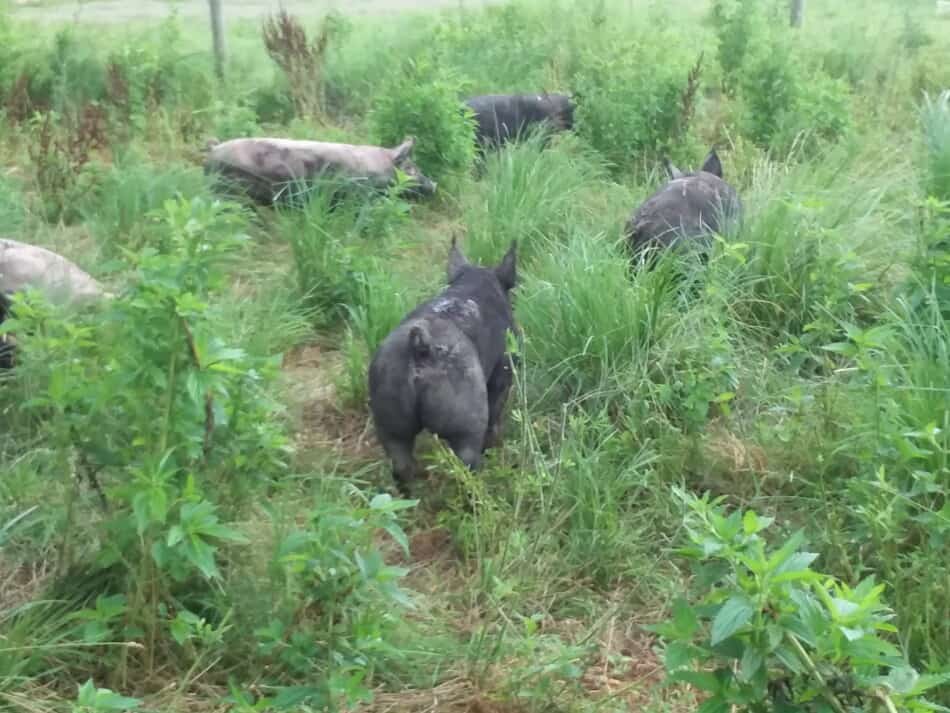
How to figure the cost of locally raised pork
In our area, to get a pig that has been raised in the same manner as the ones I am raising I would need to pay $3.50 per pound hanging weight.
This includes butchering costs unless you do the added cost things like meat sticks or smoking, for those you pay for the extra cost.
For this pork you would be have a hanging weight of 216 pounds (72% of 300) and would be getting 150 pounds of meat for $5.04 per pound.
216 x $3.50=$756 total price divided by 150=$5.04
A note on the above math: the hanging weight is always noticeably higher than the weight of the retail cuts (that’s the packages that go in your freezer).
If you want to get a good estimate of the amount of meat for your freezer use 60% of live weight.
Compare the cost to specialty raised pork
For non GMO pasture raised pork, prices in my area are more like $8.44 per pound of meat if you buy a whole or half hog.
Buying individual cuts would cost more per pound.
This pork would cost you $442 for half a hog and $844 for the whole hog.
These are the types of prices that you need to be using when making your price based comparisons.
If you can raise a pig for less than $5.00 per pound of meat, you are getting amazing nutrition and taste for a steal!
How to figure the cost of your pork
So, what are your costs?
Using the feed costs listed in this article you will have $190-280 cash into each pig, not including equipment or time.
Add in the cost of buying the feeder pig, $100 or so, and butchering costs of about $1.00 per pound and you end up with a 300 pound pig costing you $440-530 for 150 pounds of meat.
That’s $2.93-3.53 per pound! To me that is definitely worth it!
Pigs are easy to raise
The best thing about raising pigs for pork is that they are pretty easy. Really, you just need to check on them twice a day and make sure they seem happy.
Pig fencing or pen material is commonly available, as well. Whether you choose to use electric fencing or cattle panels and T posts, it’s easy to set up a fence or a pen for your pigs.
Even if you do not have much (or any) livestock experience, pigs are a great place to get started with raising your own meat.
As far as the skill needed to raise your own pork, you’ve got this! Raising your own pork is definitely worth it!
It will take 4 months to raise your pig
Are pigs worth your time? Yes! You get a lot of meat for a short amount of time.
Your pigs will take around 4 months to reach finishing weight and condition. Condition is the amount of fat on the body and in the meat, you need it for flavor.
Most people that raise their own pigs are shooting for a finishing weight of 280-300 pounds.
If this weight sounds a bit high to you, plan to butcher your pigs sooner, more like 250 pounds.
We like closer to 300 pounds because you get bigger cuts of meat and more flavor from the fat. Don’t let the word “fat” throw you. Fat is flavor.
If you want great tasting pork, you must have some fat in the meat.
How Long To Raise A Pig? gives you more of an exact schedule, depending upon the age of your pigs and how you raise them.
You need feed, a waterer and a roomy pen with shade
Once you are set up to raise your pigs, getting a couple of feeder pigs every summer and butchering them in the fall will be easy for you and popular with everyone who loves great tasting pork!
To make raising pigs as low labor as possible, have a waterer and a feeder that can both hold a few days worth before needing refills.
We use a 55 gallon plastic barrel with a gravity fed water cup for the water and a bulk feeder. Both are used every year, have held up for 20 plus years and have been paid for many times over!
I should mention, the water cup did need replaced last year. It cost $34.00 and took less than 10 minutes to fix.
Of course, you still be checking your pigs twice a day, this is just good animal husbandry! With the right set up these checks will be fast and easy.
How Many Pigs On 5 Acres? shows you how to put together your pig raising plan, complete with pasture rotation ideas.
It will cost $190-280 in feed to raise your pig
| Source of pig feed | Cost per pound | Cost per pig |
| 50 pound bags @ farm store | $0.36 | $234 |
| 100 pound bags @ feed mill | $0.16 | $104 |
Feed costs are going to be your biggest variable in raising your own meat. Feed costs will depend upon what type of feed you get and from where.
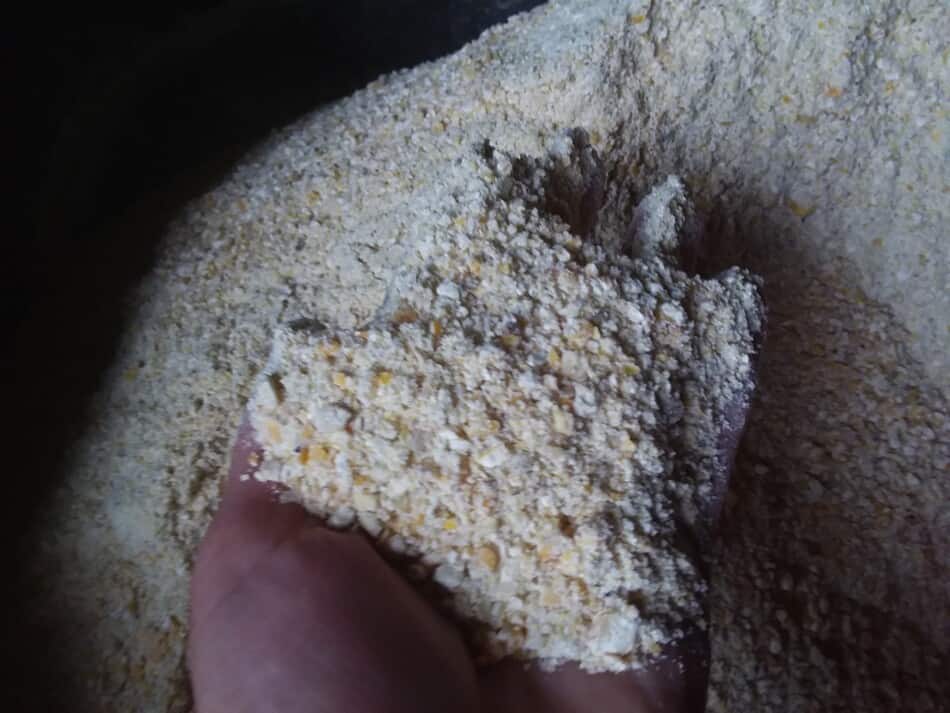
Farm store feed costs $0.36 per pound
Most people use the 50 pound bags available at the nearest farm store. These will work just fine.
In our area 50 pound bags of feed cost $18.00 each, which is $0.36 per pound of feed. Since you’ll need 600-700 pounds of feed per pigs, we’ll use 650, that’s $234 in feed.
Feed mill feed costs $0.16 per pound
If you have a feed mill close to you, stop in and see what they have available.
You will be stunned at the difference in feed costs when you can get the floor stock from the mill. Floor stock is 100 pound bags of the most popular feeds that the mill grinds and keeps on hand.
The feed mill we go to has floor stock pig feed for $16.00 per 100 pound bag! That’s $0.16 per pound. For the same 650 pounds of feed per pig that you’ll need, the cost of this feed is $104.
You can make your own pig feed
If you are thinking “what feed mill?” don’t worry, just use the 50 pound bags of feed or use the charts in my article Pig Feed Rations and make your own.
You will get 120-150 pounds of meat per pig.
The amount of meat you get will be determined by the genetics of the feeder pigs you purchased and the finishing weight that you got them up to before processing them.
Generally speaking, a wider built pig will have more meat when processed than pig with a more narrow build.
As mentioned above, we like our pigs on the bigger end, more in the 300 pound range. If you are a sausage lover, make sure you go with a higher weight.
The amount of meat you put in your freezer will also depend upon what cuts you decide to get, but overall a lighter pig (more like 250 pounds) will get you the 120 pounds of meat and the heavier pig.
For example, anything smoked will weigh less after smoking than it did before smoking and boneless chops weigh less than bone-in chops.
For more details on butchering costs read my article Cost To Butcher A Pig.
Total cost is $2.93-3.53/# of pork
This is the number you need to be looking at when you decide if raising your own pork is worth it to you. Are you willing to do the work to save the money?
It’s no contest for us, we don’t even figure the cost comparison anymore. We don’t need to, it’s so easy to see the value of raising our own pork.
Granted, you will need to have some other money invested in things like cattle panels or electric fencing and feeders and waterers.
Once you buy these they are used repeatedly, so I didn’t include them in the cost of the pork.
Compare your estimated cost to what you can buy
This is the last step, if you are still unsure about the value of raising your own pork.
Start doing a bit of research and figure out what is the cost of raising your own pork in your area. When it comes down to the answer, it only matters what you can do in your area and at what price.
Things you need to know:
- Be sure to consider what exactly the price of the pork for sale includes and does not include.
- What are the butchering costs in your area?
- Where is the closest custom butcher?
- What is the cost of a feeder pig and how far to you need to travel to get them?
- How close is the nearest feed store with the feed you want?
- Who will buy your other pig? (You are raising at least two pigs, right?)
What if you don’t like pigs?
You do have some options here.
The easiest one is to get in touch with a family that has kids raising pigs for the county fair and buy some of their extra pigs.
At most fairs, kids can only sell one animal, yet needed to raise at least two to keep the pigs happy, so they have an extra butchering size pig that needs to be sold.
Usually these extra pigs are “turned” which means sold for the local auction price for the week. You could easily snap up one of these pigs for yourself and help out the young pork producer at the same time.
Or you can attend the fair auction and buy one of the pigs that sell. If you like a fun event, this is the one to pick.
Ask around in your area or online? More people raise pigs than you think, see what you can find.
Try the local butcher shop. They will know who is raising their own meat.
Get together with a friend and one person does the work, the other person pays, or any other arrangement that suits you.
There are no limit to the possibilities, here.
If you still come up empty handed, why not decide to raise those porkers yourself?
Importance Of Water For Pig Health is one of a series of great articles on small scale pigs by Dr. Michaela Giles. Be sure to read through them when you get the chance.
